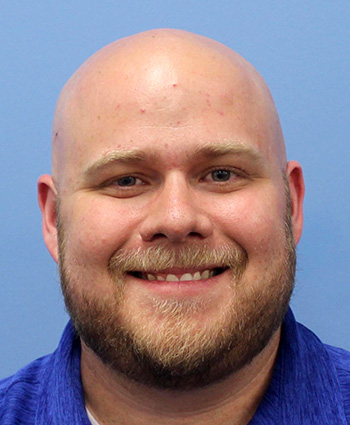
Peyton Cline joined NREL’s Materials Science Center in July 2022 as a postdoctoral researcher in Mark van Schilfgaarde’s research group. Peyton earned his bachelor’s degree in chemistry from Princeton University in June 2013, and he continued his academic career in August 2015 by entering the doctoral program in chemistry at the University of Colorado Boulder (CU-Boulder). In 2016, he transitioned to the chemical physics program and joined Professor Joel D. Eaves’ research group, and he later earned his doctorate in August 2020. From September–June 2022, he continued to work with Professor Eaves as a postdoctoral researcher before embarking on his new career at NREL.
During his time at CU-Boulder, Peyton worked with Professor Eaves on several projects that focused on the effects of local quantum impurities in relatively large-scale systems. His primary research concerned developing a theoretical description for a then-recent experimental discovery by the Dukovic group at CU-Boulder: surface-trapped hole diffusion in CdS and CdSe nanocrystals. He employed density functional theory to generate the adiabatic states relevant to the problem, followed by a transformation into a diabatic Wannier sp3-orbital basis. Within the Wannier basis, it turned out that the surface-trapped hole diffusion problem mapped exactly to the Fano-Anderson “localized state in a continuum” model, which yields an exact solution under certain conditions. These conditions held for the hole diffusion problem, and by calculating the Green’s function matrix elements for the diabatic hole states, he arrived at a formally exact theoretical description. The calculated results matched quantitatively with experimental observations.
At NREL, Peyton is working with Mark van Schilfgaarde to expand the functionality of the Questaal code, which employs quasiparticle self-consistent GW theory to calculate the electronic structures of a wide array of materials. Additionally, he wishes to utilize the Questaal code to describe superconducting properties of unconventional superconductors, which are notoriously difficult to characterize with lower levels of theory or with simple theoretical modeling techniques.
Research Interests
Density functional theory
Quasiparticle self-consistent GW theory
Unconventional superconductivity
Education
Ph.D., Chemical Physics, University of Colorado Boulder
B.A., Chemistry, Princeton University
Professional Experience
Postdoctoral Researcher, Eaves Research Group, University of Colorado Boulder (2020–2022)
Featured Work
On the Nature of Trapped-Hole States in CdS Nanocrystals and the Mechanism of Their Diffusion, Physical Chemistry Letters (2018)
Surface-Trapped Hole Diffusion in CdS and CdSe: The Superexchange Mechanism, Physical Chemistry C (2020)
The Motion of Trapped Holes on Nanocrystal Surfaces, Physical Chemistry Letters (2020)
Share
